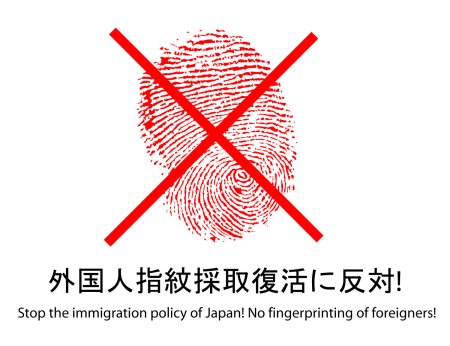Despite protests from human rights organizations and the foreign community, new immigration procedures, which require all non-Japanese citizens over 16 years of age to be fingerprinted and photographed when entering Japan, will come into effect on November 20, 2007. Fingerprinting of foreign nationals in Japan is not a new affair, however. Japan used to fingerprint foreign residents until, following protests mainly organized by “special permanent residents” of Korean and Chinese descent, the system was abolished in 1999. But this time, it came back under the name of the war on terror.

Illustration: Flickr user stbeck CC-BY-NC-SA
To many Japanese, the introduction of the new system, let alone the passing of the bill, is still unknown. futureeye points out to the fact that the new system has been put in place without most Japanese even knowing.
今回の一番の問題は、住基ネットのときのような、賛否両論に分かれた議論がなんらなされていないことです。この法案がいつ通ったのかさえ、国民の大部分が知りません。日本政府の言い分としては、「外国人に対しての指紋照合制度であり日本人は無関係の法案のため、住基ネットのときのような議論は不要である」程度の反論が考えられます。しかし、前述したように、相互主義は世界政治の常識です。後々日本人に付けが回ってきます。このような法案を、我々が知らないうちにこっそりと通していいのでしょうか?
Blogger Danny Choo writes:
I'm not exactly sure how fingerprinting somebody is going to stop evil intentions. If a person wants to blow him/herself up then a fingerprint is not exactly going to stop them from doing so.
I can see how it can play a part in preventing overstay – photos of overstayers can be published as soon as their permitted stay has exceeded for example.
As Japanese blogger oheohehe puts it:
時代の状況を考えれば当然の事です。
やましい事を考えている人間だけが文句を言うだけだ。
例えば朝鮮人や〜社民党の方々、弁護士の一部・・・・・
Only those people who have an evil conscience complain about this.
For example, North Koreans and members of the Social Democratic Party, and some lawyers…
This blogger gives his version of explanation as to why foreigners should be fingerprinted.
指紋押捺制度はこう説明すべきなのだ。
外国人には日本人と違って戸籍がない。
だから日本人と異なる取り扱いをしても,不当な差別にあたらない。戸籍がないため,入国している外国人は一定の管理の必要があるといえる。
また外国人犯罪も凶悪化している。入管行政の実効性も確保しなければならない。ただ写真照合では同一人かどうかの判断は極めて困難。
個人を特定する上で「指紋の押捺」が最も確実といえる。ゆえに指紋押捺制度は必要。
Unlike Japanese citizens, foreigners do not have koseki.
Therefore, treating foreigners in a different way is not unfair discrimination.
Because foreigners do not have koseki, there is a certain necessity for foreigners who have entered Japan to be kept track of.
Also, the intensity of crimes committed by foreigners is increasing.
Just matching photos is not enough to verify that it's the same person.
Fingerprinting is the most efficient way of identifying an individual.
Therefore the fingerprinting system is necessary.
On the other hand, there are many bloggers who express their criticism of fingerprinting. Blogger Odoru OL writes:
海外旅行で入国審査時に顔写真や指紋を取得されるのは、犯罪者の予備軍と見られているようで、あまり気分は良くありません。
まして、審査官はともかく、入国審査窓口に並んで待っている外国人を誘導する警備員のような人たちの態度は、往々にして悪いことが多いです。なので、テロ対策という名目は分かっていても、完全にテロを防止できるわけではないのに、なぜ善良な市民がそのしわ寄せを受けるのか、といった文句も、長い行列にうんざりしているときには、頷いてしまったりします。
(時間がかかりすぎて搭乗時刻に間に合わなくなると、一転してスルーパスになることも疑問です。)
On top of that, leaving aside the immigration officers, people who look like security guards and guide foreigners lining up at immigration counters very often have bad attitudes.
So, even though I understand that it is a part of the anti-terror measures, when I get sick and tired of being in a long line, I have to agree with those who complain: why do good citizens have to deal with this even though you can never completely prevent terrorism? (The fact that you are allowed to pass through [immigration] in cases where you are close to your boarding time and [being checked] would take too much time also raises questions.)

Animation by Nick Wood, posted at debito.org
Tako expresses his disappointment and criticizes the Japanese government for focusing on the wrong target.
この11月から、日本へ入国する外国人は入国審査で「指紋採取」および「顔写真撮影」されることとなるんですって(例外あり)。これは米国に続いて二国目です。
いつだったっか、日本在住の外国人に対し、外国人登録時に指紋を取らなりましたよね。頭から外国人を犯罪者扱いしなくなったから「日本もまともに近づいたね」と思っていたのに、ああ残念。
今回導入される入国審査規定の紹介ビデオが政府のホームページで見られるので、興味のある人は是非見てください。
テロ対策という大義名分ですが、うさんくさいなあ。
近年のテロって、同国籍の人物によるものばかりじゃあないですか(イギリスで起きたテロは少なくともイギリス国籍の人物だった)。それに日本で起きたテロらしいテロと言えば地下鉄サリン事件などで、結局日本人の仕業だったし。訪問者を疑うよりも国内の怪しい組織の動きにもっとアンテナを張ってもらいたいものです。
Some time ago, they stopped fingerprinting foreigners in Japan. I was thinking [at the time]: “Japan has stepped closer to becoming a decent country”, since Japan had stopped automatically treating foreigners as if they were criminals. Oh am I disappointed.
You can watch a video explaining the immigration examination policy, so check it out if you're interested.
They say they are doing it in the name of anti-terror measures, but it sounds sketchy.
Many recent cases of terrorism were carried out by individuals who held citizenship of the country (the terror incident in England at least was done by British nationals). And speaking of cases in Japan that you could all terrorism, we have for example the Sarin gas attack on the Tokyo subway, and that after all was done by Japanese nationals.
Rather than suspecting visitors, I wish they would instead keep an eye on the actions of suspicious organizations in Japan.
For comprehensive background and up-to-date information in English, see the fingerprinting NJ archive at debito.org.







24 comments
Japanese citizens have been excluded from this debate. Only Japanese citizens can change the laws of Japan, by writing to members of the Diet, the prime minister, and the minister of justice. So, please write to these people, and tell them their decisions will influence your votes. Please stop the fingerprinting and taking of mug shots of Japan’s guests by writing to this address, using paper, envelops, and postage stamps –
Prime Minister Fukuda, prime minister’s residence, postal code 100-0014, 2-3-1 Nagata-cho, Chiyoda-ku, Tokyo
I am going to be accused of sounding defeatist here, but do you think the letters of complaint of any number of foreigners in Japan is going to change their policy? It won’t even make them sit up and listen to us.
Sorry for not feeling the “Revolution!” vibes but that’s my opinion on the subject.
Hello Hanako Tokita! There is a factual error in your original story. The fingerprinting and mug shots start at age 17 not 18. So people 17, 18, and 19 are subjected to this treatment. Since people are not legally adults in Japan until age 20, this means that foreign “children” are being treated like adult criminals when they enter Japan.
Not feeling the “Revolution!” vibe?
Try wearing a “Yokoso Japan 11/20 commemorative tee” around town. Guaranteed to spark conversation and interest in the cause from foreigners and Japanese nationals alike. I have found my “voice”!
http://samuraicanuck.tripod.com
I’m loving that T-shirt! Will definitely be making a purchase of that. Thanks!
To DAVE:
You are pointing out a big problem with the internet. It does not encourage people to read and think before giving an instant reaction.
My comments above are addressed to Japanese citizens only, not to non-Japanese citizens such as yourself.
So your note could be misconstrued as an attempt to try to discourage Japanese citizens from participating in Japan’s democratic process. I am sure that was not your intent, so please join me in supporting Japanese citizens who want to participate in the democratic process.
By the way, if citizen participation, such as simply writing to one’s elected representatives were a “revolution” now, democracy and freedom would be dead and we would all be lining up for the death camps.
To All non-Japanese citizens:
I also encourage you to write to your nation-state governments.
Since the human rights violations were initiated by the U.S. government, I encourage all U.S. citizens to write to their president and members of congress. Otherwise JFK, RFK, and Martin Luther King died in vain.
The U.S. actually exempts some foreign citizens from the criminal treatment, including Canadians and citizens of 27 other countries.
However, non-Canadian citizens, including Japanese citizens, are forced to carry passports with computer chip tracking devices in them as a condition of avoiding being fingerprinted and mug shot at the U.S. entry points. Imagine what Hitler could have done with that kind of identification card.
So I also encourage all non-U.S. citizens to write to their governments and ask them to tell the U.S. that its policy is unacceptable. The U.S. has only 4.5% of the human population and should not be permitted to ride roughshod over the world, as if the U.S. were the former minority rule dictators of South Africa.
Remember Mahatma Gandhi, who campaigned against the compulaosry fingerprinting of people from India in South Africa.
Brazil is already retaliating against the U.S. by fingerprinting and taking mug shots of only U.S. citizens. While this is appropriate, it is not a good idea because it simply spreads the problem.
Finally, I have travelled, worked, and lived in military dictatorships, including General Pinochet’s Chile and Suharto’s Indonesia, as well as the former military dictatorship in South Korea, etc. But none of those dictatorships demanded or took my fingerprints or mug shot.
So no “democracy” should be worse than these dictatorships. We are all giving up the freedom that millions have died to protect and preserve. They were not political leaders or revolutionaries. They were just ordinary people who said “No.” to dictatorship.
DAN,
A little harsh to say I didn’t read and think before responding. After I reread the article I could see your point. I thought you were saying that as foreigners, we are excluded from the normal passages of debate and so we should write letters. Now I see you’re directing that towards Japanese themselves.
Are Japanese overly concerned about this though? Some may try to use the recent alleged rape allegation by a US marine as evidence for this to continue, but they forget that SOFA status personnel wouldn’t be fingerprinted anyway.
To Dave: No offense meant. It seems to be an electronic writing problem which is not limited to you or to anyone else in particular. (Note also my typing mistake which is still there, in the paragraph about Gandhi. I meant to type compulsory, not “compulaosry”. I hope the editors will correct that one.)
By the way, I have no idea what “SOFA” means, other than chesterfield or couch. I wonder how many people, even anglophones, know what it means. Could you please spell it out.
Thank you for your comments. I have nothing further to add on this topic, but I will read any further comments from you and other people.
By the way, I have managed to get a hundred Japanese citizens, people I know personally, to write to the prime minister, so far. Perhaps you could do the same?
Have you written to your elected representatives in your nation-state yet to complain about the U.S. and Japan? It is better to act than to simply grumble to yourself or to shout into the great cyber void.
I forgot – I never knew what SOFA was until I came to Japan. It actually stands for Status Of Forces Agreement, and refers to all military personnel and their dependants in a country who are bounded by this agreement between the armed forces and their host country.
Hi Dan,
Thank you so much for pointing out the eorror. I went back to the Justice Ministry website to chech the target age and it’s actually 16 and older. I changed it in the post.